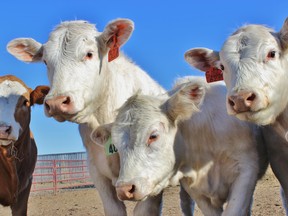VIDO: Advancing human, animal health at home and abroad
VIDO is committed to protecting Canada and the world from infectious diseases, in both animals and humans. Approximately 70 per cent of the pathogens that affect humans come from animals.

Article content
The recent COVID pandemic drew widespread attention to VIDO — the Vaccine and Infectious Disease Organization — and its outstanding work to protect human health. While that recognition is well-earned, it is important to remember that VIDO is a unique “one health” research centre addressing pathogens in animals as well as humans. Three examples help to illustrate the scope and importance of the organization’s work in the field of animal health.
VIDO was created in 1975 at the University of Saskatchewan to fight infectious diseases in Canada’s livestock industry, and it is no exaggeration to say that VIDO’s vaccines have protected livestock in Saskatchewan and elsewhere from infectious diseases that cost the industry billions of dollars. Dr. Andrew Van Kessel, director of research at VIDO, cites the vaccines his organization has created to fight bovine respiratory disease. “It’s a complex disease that is driven by a number of different viral and bacterial pathogens,” says Van Kessel. “We have developed vaccines that have then become commercialized to protect cattle, especially in feedlots, where the animals are most likely to come in contact with respiratory pathogens as they are mixed with cattle from other herds and may be stressed as they adjust to the new environment.”

Pork producers, too, realize the importance of VIDO to their industry. That’s especially true with a major threat to Canada’s swine industry now on the horizon: African Swine Fever (ASF). “It’s a viral disease that is 99 per cent fatal in pigs,” notes Van Kessel. “It’s been making its way across Europe and has really devastated the eastern Asian swine industries. It’s now been found in the Americas — in Haiti and the Dominican Republic — so for the first time in 40 years, it’s not that far away.”
ASF is classified as a “reportable disease”, which means that as soon as a country detects it, the discovery must be reported to the World Organization for Animal Health. If that happened to Canada, the countries that purchase our pork would likely close their borders to our products, even though the disease does not affect humans. Considering that two of every three pigs we currently produce are exported to global markets, just one infected pig could devastate our pork industry overnight. The good news is that VIDO is working to produce a vaccine to safeguard our animals while protecting our export markets.
“We’re one of only a handful of facilities in the world and the only non-government facility in Canada that has approval to work with the African Swine Fever virus,” says Van Kessel. “It’s classified in Canada as a foreign animal disease and thus requires a strict standard of containment and monitoring. The only other facility in Canada allowed to research ASF is the Canadian Food Inspection Agency’s National Centre for Foreign Animal Disease in Winnipeg.”

VIDO’s contribution goes beyond protecting Canada’s economy and well-being. Such is the case with VIDO’s initiative in recent years in Africa, working with its partners in Kenya to battle a common disease in cattle called lung plague (contagious bovine pleuropneumonia). Lung plague can have a serious impact for smallholder farmers, but new hope is in sight. Drawing upon its experience with cattle vaccines and large animal models of disease, VIDO and its collaborators in Africa have developed and are advancing an award-winning vaccine for lung plague. “It’s part of being a global citizen,” explains Van Kessel.
These three examples only touch on the range of animal health research at VIDO, from bats to bison. VIDO is known internationally for its containment facilities and expertise in developing large animal models of disease to better understand how a pathogen causes disease and develop control strategies. A new facility is now being built to house and contain more exotic species, including disease-carrying insects like ticks.
While other disease research facilities focus on either animal or human pathogens, VIDO’s “one health” philosophy incorporates both, for good reason. As Dr. Trina Racine, director of vaccine development at VIDO, explains, “About 70 per cent of the pathogens that affect humans have come from animals, so if we can protect animals, we can protect ourselves.” As such, important work is being carried out at this human and animal health interface. This includes vaccine research and development targeting avian influenza (or ‘bird flu’) — which can also cause disease in humans.
BECOME A FRIEND OF VIDO
None of this research would have been possible, or will be possible in the future, without the continued support from the federal, provincial and municipal governments, the business and ag sectors, philanthropical foundations and individual donors.
Individual donors are essential to show widespread support for VIDO as Canada’s leading disease research facility. To find out more about VIDO and ways to support it, visit www.vido.org. Charitable donations can be made at the website’s “Friends of VIDO” page.
THIS STORY WAS CREATED BY CONTENT WORKS, POSTMEDIA’S COMMERCIAL CONTENT DIVISION, ON BEHALF OF VIDO.